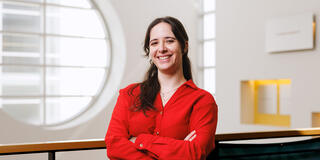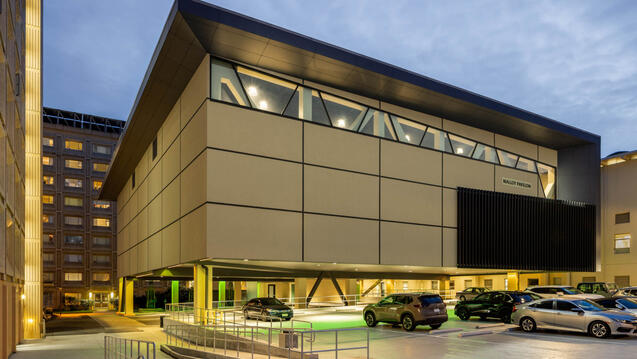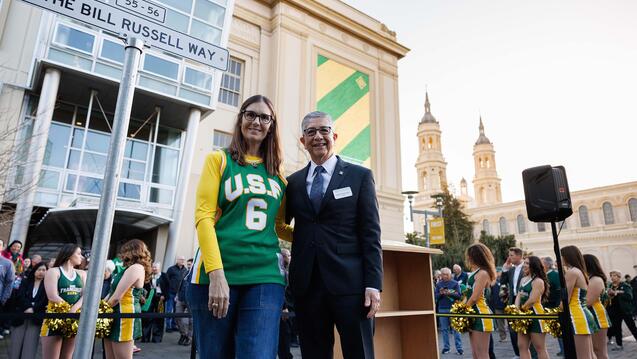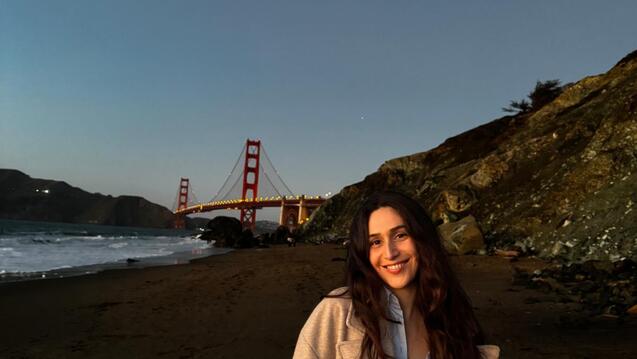Meet Emma Juan Salazar ’25

Where are you from and what is your background?
I'm from Andorra, a microstate in the Pyrenees between France and Spain. I graduated with a degree in Computer Science (CS) from the Paul Sabatier University in Toulouse, France. While pursuing my CS degree, I did an exchange year at La Sapienza University in Rome, where I was able to explore a new culture and language.
The choices I have made regarding my education have been motivated by different things. When it was time to decide on a bachelor’s degree, I knew I enjoyed mathematics and computer science. I simply chose what I liked. But what to do once that was done? Working in a big tech company seemed like a fun job, but what is the outcome? What would my purpose be?
The circumstances in my life guided my choice in this matter. My mother was diagnosed with primary progressive multiple sclerosis (PPMS) before I left for university. It wasn’t until time started to pass that the effects of the disease started to have consequences on her life and on our family. Obviously, the first impulse one has is to protect the person they love. But how can you protect someone from an incurable disease? PPMS is the most aggressive (without remitting episodes) and the least common form of the disease (approximately only 15% of MS patients are diagnosed with it). Consequently, even though it’s the worst, PPMS is the form of the disease with the fewest resources dedicated to its research. We don’t know enough about the disease, or how to treat it. This realization put into perspective what is important to me. And so, I already knew what I liked to do, and in that moment, I found what mattered to me.
Once I knew what, it was easy to identify how. Then I found bioinformatics. The perfect mix of computer science and mathematics with biology and biomedicine, with attractive job prospects as a researcher. I quickly realized I loved this field, and decided to pursue a Master's degree in Bioinformatics for Health Sciences at Pompeu Fabra University in Barcelona. While in the middle of this program, I received a Fulbright scholarship to advance my education in the US. I am now pursuing a Master's Degree in Data Science at USF.
Why did you apply for this graduate program and decide to study at USF?
The need for bioinformaticians grows more and more each day and is expected to continue to increase. This is due to the fact that tools to collect information have gotten more precise and efficient, which translates into an enormous amount of information to process. This creates a need for professionals that are able to analyze this data efficiently. Consequently, I asked myself: “Is specializing in bioinformatics enough?” To my understanding, the answer is no. The data science field advances at an exponential speed, therefore it needs people that have deep enough technical knowledge to keep up with it. Being able to devise new computational strategies is what will determine whether or not research advances. Having a deeper knowledge of data science will grant me the means to innovate and find new mechanisms and techniques in the field of bioinformatics. That's why I decided that adding Data Science to my background was the way to go.
I chose USF and their MSDS program because the curriculum and approach is the one I found more fitting for myself. Between the excellent curriculum and the 9-month practicum, I found USF to be a perfect place to advance my knowledge in Data Science. The San Francisco Bay Area is an ideal place for me to go deeper into the tech and data world.
What impacts has the Dean's Scholarship had on your ability to further your studies?
Even though I had funding from the Fulbright committee, without the Dean's Scholarship I wouldn't have been able to afford to come to the US and study. I am incredibly grateful, because studying at USF is already proving to be an amazing opportunity and experience, where I get to learn from amazing professors and exchange with students from different backgrounds and from all around the world. Coming to San Francisco, one of the most important technology hubs in the world, has been possible to me in part because of the Dean's Scholarship.
What are your career ambitions?
After the completion of the master's degree, I want to work as a data scientist in biomedical research. To work with data in this field, a certain knowledge of biomedicine is necessary. Given that I already have a specialization in bioinformatics, I have the freedom to choose a more technical curriculum, deepening my knowledge of data science, data analysis, algorithms for data science, artificial intelligence, machine learning, deep learning, and others. My knowledge in both computer science and mathematics makes data science a natural outcome, being a field that heavily relies upon computational tools and statistics. The union of mathematics and computer science, and ample knowledge in data science, makes for a bioinformatician with an ideal set of skills to further research in the biomedical field.
What is something unique or interesting about you?
Catalan is my first language, but growing up in Andorra gave me the opportunity to learn three other languages. I fluently speak Catalan, Spanish, French, English, and know some Italian and Portuguese. I have lived in 5 different countries, including 3 major cities: Barcelona, Rome, and San Francisco. I have been lucky to discover a lot of different people and cultures, and I am eager to keep exploring and discovering different places!
Are You ELIGIBLE?
The Dean’s Scholarship recognizes a select group of incoming students in graduate programs, who the admission committees believe will make a substantial contribution to the programs. Recipients are selected based on merit. To be considered for the Dean's Scholarship, students must apply to their program by the program's priority deadline.


